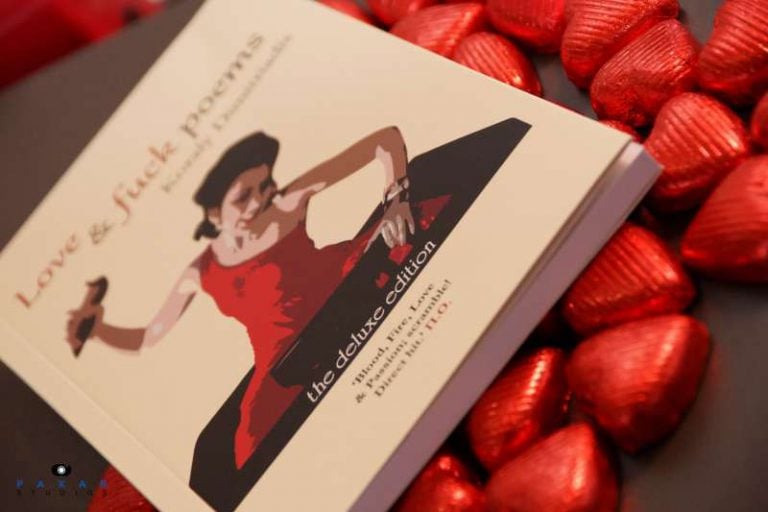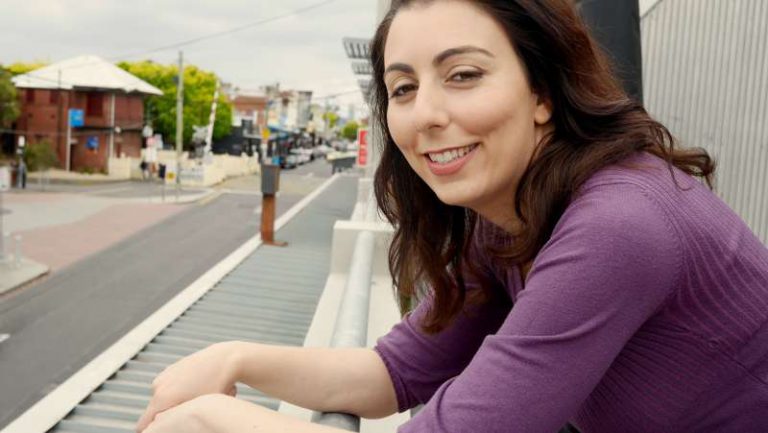What makes a woman who spent 30 years ticking all the boxes that come with the ‘good Greek girl’ stereotype throw everything out the window and go on the most provocative and confronting poetic rampage?
Love and Fuck.
Koraly did not just wake up one morning and decide to fuck up her perfect little reality. Koraly decided she loved herself enough to allow her personal truth to be expressed.
She gave vent to her feelings. She did not embarrass herself. She chose not to be embarrassed. She realised she was normal, yet ‘normal’ is such an overrated word.
“Being a woman, writing about such controversial things, makes you wonder if you are well in the head sometimes,” Koraly says, laughing.
“Especially when everyone around you is like, ‘what’s wrong with you, why can’t you just be normal?'”
The first time I saw Koraly, it was a few years ago in Cyprus. By accident, while picking a friend up from a venue. I saw her on stage bursting with rage, almost like a volcano. I saw an angry woman talk about sex, in the most awkward – in my sense – way. A woman struggling to express her Australian ‘coloured’ psyche with crippling Greek-Cypriot words.
I did not get it at the time. I too thought she wasn’t normal. Best-case scenario, she was a repressed conservative woman from a village, putting on a ‘liberated’ feminist act with an English accent. That performance stayed with me for a while, made me ponder.
“Poor woman,” I thought. “It’s sad that her own words seem to be hurting her so much … almost as she doesn’t own them.”
I harshly criticised her performance in a long debate about people in the arts who fail to deliver their message.
“Her lines make perfect sense but she makes it seem so hard, when it’s only so natural. Too much unnecessary violence.”
But Koraly deliveres her message flawlessly.

“Both my parents came from really poor villages,” she explains. “Like most migrants in Australia, they sacrificed their desires to give their families a better life. ‘Our children are going to have secure jobs because we didn’t. Our children are going to be doctors, lawyers and accountants’, they said.
“When I went up to them and announced that I was going to be an artist, their world crumbled.”
Koraly has, since she can remember herself, been creative in this way, but had never been encouraged to pursue her goals and explore her desires.
“I guess, like several other minorities, Greek diasporans struggled to preserve their cultural heritage,” she says.
“They had, however, moved so far away from home, making it impossible to keep up with the ever-changing and evolving reality of Greece. Especially people who left at a young age or without having received proper education, they are captives of their 1940-1950 mindset.”
For fear that she would lose her Greek identity, Koraly’s parents brought her up with strict Orthodox values, infused with well-intended yet flawed perceptions, filling her soul with guilt even from an early age. She wasn’t allowed to watch kissing or sex on TV, and sex was rarely discussed. She was not allowed to have a boyfriend. She had to remain a virgin until the day she’d leave the family home, holding a marriage certificate.
“Each time I tried to express an interest in something artistic my family would be like, ‘go back to your studies and stop talking rubbish’.”
“And that’s exactly what I did,” she admits.
Even though she had ‘outed’ her artistic nature, she went on to pursue a double degree in accounting and computing. She found a well-paid job and got married. As expected. Happiness, however, was nowhere to be found. Life went on, almost neurotically, until her perfectly-moulded reality started crumbling. The foundations of her marriage were shaking, she had become a mother, yet she felt unable to define herself. And how can one mother bring another young woman into this world and teach her to be proud of herself if they haven’t faced their own demons?
“It took me 30 years to burst out of that bubble and find the courage mainly in myself to say: ‘You know what? I don’t want to be married. I don’t want to be religious and I don’t want to be a computer programmer’,” Koraly says.
“That was when I did a diploma in professional writing and editing to become a poet. I thought that I had to go to uni and again follow rules.”
The good Greek girl asked her then poetry teacher at RMIT TAFE, Ania Walticz, to teach her the rules.
“There are no rules,” she said.
“If we all followed the same rules we would all sound the same and how boring would that be?”
This notion was so liberating for Koraly, who wrote 300 poems within the space of one year, and in mid-2011 put out Love and Fuck – the Zine, accompanied by her own drawings, selling 500 copies.
Soon after, her venture took on a life of its own and became a book, published by Outside the Box. Her stories resonated with many women, and men. She was asked to perform, to go on stage and share her poetry.
“It was from there that I started performing and I was really angry back then when I came out of the marriage and the culture,” she tells Neos Kosmos. “I’m not angry anymore.”
“It’s been so hard for me to fight my way out of my pigeonhole, in order to be who I want to be … to find my peace of mind.”
Anger was Koraly Dimitriadis’ springboard to create a dual-effect so that the audience could grasp the subtext. What it is like to bottle someone up for 30 years?
“When I perform I want them to feel how I feel. I didn’t train as an actor. It makes sense that I come across as raw and confronting,” she says, revealing that she still operates in quite a conservative environment.
“I still can’t talk about sex openly in my personal life without feeling embarrassed. It is me against myself on stage. This is what I’m trying to overcome.”
The writer, poet and performer wants to connect not just with the Greek, but with all the repressed people battling gender, religion and ethnic stereotypes. She acknowledges the fact that she can’t completely tear apart her identity and build a brand new persona.

Through her poems she encourages the reader to embark on a journey of self-discovery. Each topic is ‘dissected’ viscerally and exposed from every angle.
She becomes the girl, the woman, the mother, the father, the husband, the lover, God, even to expose the true nature of love and … fuck.
Her art, cynical and blatant as it may be, is a metaphor waiting to be interpreted into that painful truth, able to set the reader free.
“We are sometimes too eager to condemn and don’t go that extra mile to understand why that person on stage or that writer chooses to touch on things in a certain way,” she says, and she couldn’t be more right.
“What pushes me is that for almost all my life I was fitting that mould, I was in that box, so I force myself out by being vocal and doing exactly what makes me feel uncomfortable.”
Even though Koraly has a very loose definition of what art is in general, what differentiates an artist from an opportunistic ‘provocateur’ is the way their work makes people think. From the plethora of interactive performances and exhibitions surfacing the web worldwide, she finds very few things create a dialogue, arguing that “not all things go into the same basket”.
“To me ‘good’ art is meant to help people understand more deeply and connect while making a commentary on society.”
“Whether we identify with it or not, it still challenges us and helps us evolve.”
Koraly’s work has sparked critique, not only from the conservatives of Australia’s Greek community, but from several academics in the Australian literary landscape, who lashed out against her writing, refusing to call it proper poetry.
Love and Fuck defied the odds by getting published by a Cypriot house in 2014 (entitled ποιήματα για αγάπη και για γαμήσι) with the support of the Australia Council, and has been recently picked up by UK based Honest Publishing.
As part of this major collaboration, Koraly will be travelling to Europe in May to present her poems on stage.
“A lot of people think poetry can’t sell, let alone sell foreign rights. It can sell, and it doesn’t have to be boring or subscribe to definitions to do that.”
“The fact that my book is a bestseller in Australia for the poetry genre is the best proof people are genuinely connecting with my work.”
*Koraly Dimitriadis is a Cypriot Australian performer and writer of poetry, prose and non-fiction who explores feminism, racism, sexuality and culture, while challenging the traditional norms of poetry through literature, performance, film and music.
To find out more about Koraly, go to www.koralydimitriadis.com